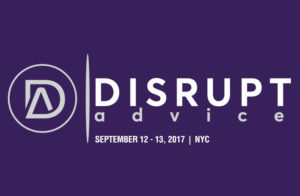5 Key Trends from the Disrupt | Advice Conference

Last month I had the pleasure of participating in the inaugural Disrupt|Advice conference hosted by SourceMedia in New York. Described as the first conference that’s laser-focused on all the ways the financial advice business is changing, the event brought together many industry thought leaders and pioneers including folks like Joe Duran (United Capital), Alan Moore (XY Planning Network), Josh Brown (Ritholtz Wealth Management) and David Canter (Fidelity) just to name a few.
The purpose of the event was to focus on the myriad forces that are disrupting the world of financial advice, from digital platforms and tools, pricing pressures, regulatory pressures, innovations in practice management, demographic changes, as well as new asset classes and investment vehicles that are attracting attention.
My panel was titled “Disrupting and Democratizing Investments.” The general theme was to explore changes in accessibility and pricing of various investment strategies. One of the common threads across the panelists was how each of us have leveraged technology to improve upon and/or drive down the costs of delivering our services, making them available and affordable to more investors. The tools being developed today can provide an immense amount of leverage.
In addition to participating on my panel, I was able to observe many of the conference sessions. My main takeaway was that the industry is changing faster than ever, pushed forward by advances in technology, new business models, and a definite focus on fiduciary duty.
5 key trends I observed throughout the event were:
-
The Evolving Role of the Advisor
The future of successful financial advice will be based foremost on planning and coaching. Clients are less focused on just having their money managed. They want to know that they are on track and that their entire financial life is included. They want to know that their unique goals, situation, decisions, and objectives are being considered and that they have a trusted ally to assist them. As a result, many advisors are already using or are evaluating outsourcing certain functions, like investment management, to focus on higher impact activities with their clients.
-
Technological Innovation
The tools that are available and being developed today provide huge opportunity to increase scale, efficiency, and value. However, it can also be challenging and time consuming for firms to identify and incorporate new technology. Those that do so successfully will have a huge advantage.
-
Fiduciary Focus
Regardless of legislative outcomes, clients are becoming more informed and assets will continue to flow to advisors who truly act in the best interests of their clients.
-
Changing Pricing Models
The standard asset-based model is being reconsidered by many. Alternate models from flat-fee, to tiered-service menus, to hourly fees and retainers are all being employed by advisors. The rest of the industry (present company not included) has been slower to explore these options.
-
Fee Compression
Fees are a huge focus for investors, and everyone is looking for ways to do more with less. Currently much of the compression has come on the asset management side. The flows into low-cost passive investment strategies has been tremendous and currently show little sign of abating.
I love attending events like this and enjoy the opportunity to share ideas, learn from others, and spend some time thinking about the ways our industry is changing. It is heartening to see that the trends I am observing, I believe, point towards better outcomes for investors.





